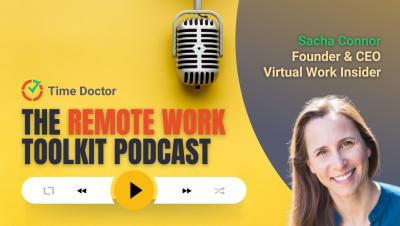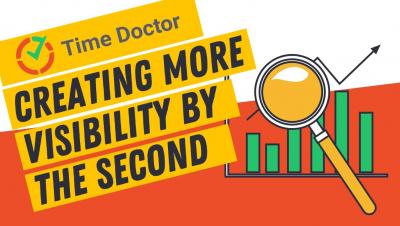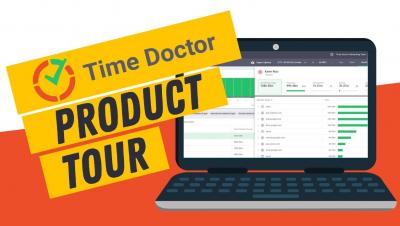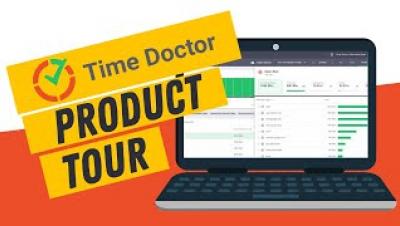Teams | Collaboration | Customer Service | Project Management
October 2021
A Definitive Guide to Call Center Compliance
From PCI DSS to HIPAA, call centers operate under several laws that help protect sensitive data captured during customer interactions. Call center compliance refers to the systematic process of abiding by these laws and regulations during daily operations. However, adhering to these laws can be challenging without the right knowledge and strategy. In this article, we’ll share five common call center compliance regulations and five smart tips to improve compliance at your center.
Third Party Integration Capabilities with Time Doctor's Chrome Extension Give You Better Workday Insights
Here at Time Doctor, we know that third-party integration capabilities have become an important factor when selecting the best software for your teams. The more integrations we can offer, the more insightful we can make your time tracking capabilities and the bigger impact that can make on your organization’s overall productivity.
The Remote Work Toolkit Podcast | Sacha Connor
Creating More Visibility by the Second with Time Doctor
Time Doctor Overview | Time Doctor Product Tour Video
15 Experts Weigh In On The Future of Remote Work
A massive disruption to the traditional work structure took place during the pandemic. We saw how it fast-tracked previous work trends. In fact, most of us will probably agree that prior to the pandemic people rarely worked from home. Then by early 2020 things drastically changed. Employers and employees alike had to get used to a new paradigm – remote working. Most employers thought it would be temporary. However, they were wrong!
What to Know Before You Start Monitoring Employee Email
If you’re planning to monitor employee e mail, you may want to read this article first. Today, many employers might be concerned about electronic communication contributing to poor employee productivity. And you might have heard that the best way to overcome the issue is by monitoring electronic communications like email. But you may be concerned about possible privacy issues. Or maybe you just want to know more about email monitoring to decide if it’s right for you. Don’t worry!
Top 10 Quality Monitoring Software for Customer Service Teams
For any business, every interaction with the customer has an impact on the brand’s image. But customer service operations are fast-paced and complex, and it can be challenging to maintain high service standards at all times — especially when you have multiple customer touchpoints. Fortunately, technology solutions like quality monitoring software have made it easier.
How Much Does Call Center Software Cost? (Factors, Tools)
Call center software helps simplify basic business processes like call routing, dialing, and reporting — enhancing agent productivity and customer support workflows. These tools are available at different prices, depending on features like multi-channel support, call tracking, and monitoring. Usually, call center software cost can range from $50 to $1500 per agent per month. In this article, we’ll cover the average cost of call center software and factors influencing the price.
How to Use Interaction Analytics to Improve Customer Service
Your business probably interacts with hundreds of customers across various communication channels every day. Each interaction holds a vast amount of data regarding your customer’s concerns, expectations, and even about how satisfied they are with your service. Interaction analytics (IA) helps you analyze all this unstructured data to personalize service and avoid negative interactions. In this article, we’ll explore what interaction analytics is and how it can benefit your company.
11 Smart Tips for Contact Center Performance Management
From hiring suitable agents to setting the right goals, contact center performance management involves a lot of tasks and processes. And while life as a contact center manager can be hectic, you can ease the workload with the right techniques and tools. In this article, we’ll cover what contact center performance management is and provide 11 tips to manage contact center performance easily. We’ll then cover three major challenges of performance management in a contact center.
Top 10 Call Center Workforce Optimization Software
Managing call center operations is no easy task. With increasing workloads, they face workforce management challenges such as staffing, agent scheduling, and falling agent engagement. These issues can affect their ability to provide good customer support. Fortunately, call center workforce optimization software can help you streamline your customer support efforts by maximizing your call center agents’ skill sets and availability.
Call Center Coaching: 5 Types, Focus Areas, Best Practices
The call center is often the company’s public face — the first interaction your customer has before or after purchase. So, coaching your call center agents to provide reliable customer service is imperative to your company’s success. While there are many ways to go about effective call center coaching, in this article, we’ll explore five key areas where you can focus your coaching efforts.
What is an IVR Call Center? (Workflows, Benefits, Tools)
Unlike traditional call centers, an IVR call center manages caller interactions through a series of automated menus. This enables customers to self-serve, leading to faster issue resolution and enhanced customer service. An IVR software also helps boost agent performance and overall call center efficiency through various automated workflows. In this article, we’ll explore what an IVR call center is, its automated workflows, and its benefits.
The Top 5 Benefits of Using Call Center Predictive Analytics
Today, most call centers use data analysis tools to get an overview of their business processes and improve decision-making. But advanced technologies like call center predictive analytics go beyond that and can help you predict future events. These predictive insights will help you improve service quality, agent productivity, and operational efficiency. Imagine the possibilities!
Top 10 Workforce Optimization Software (Features, Pricing)
As a business owner, using workforce optimization (WFO) strategies can increase your company’s employee productivity and operational efficiency. And the easiest way to reap these benefits is by utilizing workforce optimization software. The software integrates data from various sources, such as your contact center, back-office, etc., into one unified solution. These data-driven insights allow you to make faster and more informed business decisions.
Top 10 call center compliance issues (with useful tips)
What is Workforce Optimization & How Important Is It?
Companies constantly have to find ways to streamline their business processes to keep up with changing market demands. One way to do this is by implementing smart Workforce Optimization (WFO) strategies. These strategies help improve employee efficiency by analyzing existing data for quality management and performance management. For a call center or contact center, this results in better customer service, satisfaction, and loyalty.
10 Smart Practices to Lower Call Center Turnover Rate
Service agents or sales reps are the driving force behind a call center’s success. Unfortunately, the call center industry is known to face a higher employee turnover than most other industries. A high call center turnover rate is when agents leave the company faster than normal, creating a talent shortage. It’s difficult to deliver high-quality customer service or drive more sales when operating with fewer agents.
Top 12 Call Center Motivation Tips to Boost Agent Engagement
Being a call center agent isn’t an easy job. They have to deal with customers day in and day out — often unhappy, angry, or dissatisfied ones. Additionally, the pressure of meeting targets is bound to stress them out. So how do you ensure call center motivation? Don’t worry. In this article, we’ll give you 12 no-nonsense call center motivation tips to help you boost employee engagement, leading to increased overall profitability.
Top 10 Customer Experience Tools to Improve Your ROI
With ever-changing customer needs and the advent of new technologies, companies are required to provide the best customer service possible. And the quickest way to do that is by using the right customer experience tools. These tools offer features that can help increase your customer engagement — which, in turn, boosts your sales. In fact, it can help you meet your business objectives and exceed customer expectations.
What is Voice Authentication? (Pros, Cons, FAQs)
Voice authentication is an identity authentication technology that verifies a user based on their unique biometric characteristics. It’s secure, fast, and can be applied across several fields like mobile applications, IoT devices, and call centers. Moreover, the advancement in neural networks over the past few years has enabled the development of faster and more accurate voice authentication systems.
Time Doctor Overview | Time Doctor Product Tour Video
Creating More Visibility By The Second with Time Doctor
What Is A Cloud Contact Center? (Features, Benefits, Tools)
Most contact centers leverage a cloud solution to provide better customer support, boost agent productivity, and optimize workflows. A cloud contact center empowers agents with cutting-edge software solutions and automation. They have a virtual setup where a third party manages the data centers. In this article, we’ll explore what a cloud contact center is and why they’re better than traditional contact centers.
Automatic Call Distribution: Key Features, Benefits, Tools
Customer support agents may have to handle an overwhelming number of tickets every day, which can lead to productivity issues, employee dissatisfaction, and burnout. Fortunately, you can help the situation by introducing tools like an automatic call distribution system. An automatic call distribution system (ACD) connects incoming calls to suitable agents in the least time possible. This telephone system may also offer features like call queuing and voicemail for boosting agent efficiency.
Why Don't Your Measure Your Workday?
Computer Telephony Integration: What It Is, Benefits & Tools
Even today, customers prefer speaking to a live agent over talking to chatbots. These calls can make or break brands because of how integral they’re to the overall customer experience. That’s why support agents must be equipped with the right tools, like computer telephony integration, to handle customer calls efficiently. Computer telephony integration is any technology that allows interaction between a computer and a telephone.
Call Center Process Flow Charts: Templates for All Types
A flow chart call center process is becoming increasingly necessary for call centers that want to be more efficient. For starters, it helps call centers visualize their entire workflow to identify and fix any inefficiencies. Additionally, using a process flow chart can reduce call mismanagement by establishing accountability and boosting agent productivity. In this article, we’ll explore what a call center process flow chart is and its five types.
What Is Contact Center Compliance & How To Tackle It?
From customer details to call recordings, contact centers deal with tons of valuable data regularly. As a result, they must have the right systems to keep that data safe and secure to avoid a potential data breach. But how do you do that? Simple: through contact center compliance. Adhering to the established rules and regulations will empower contact centers to protect their customers’ private information.
10 Easy Ways to Improve Your Call Center Quality Assurance
When it comes to customer service, having just one poor experience from your call center can chase your customers away. That’s why it’s crucial to provide nothing but exceptional service to your customers. Fortunately, implementing a call center quality assurance program can help you out here. Call center quality assurance (QA) ensures your call center performs according to industry standards and customer expectations.
11 Awesome Call Center Software for Small Business Needs
As a small business, you may not have the resources to run a dedicated call center to service your customer base. However, customer support isn’t something you can compromise on either, especially as a small and growing company. Fortunately, there are many call center software for small business needs that can help your in-house agents handle customer calls and other related tasks efficiently. In this article, we’ll explore the 11 best call center software for small businesses.
Everything You Need to Know About a Virtual Sales Assistant
Looking to acquire more customers? How about more leads? Hoping to boost sales? Getting more customers and revenue may take you all day and night, and the same is true for every business owner. However, you cannot focus on every aspect of sales and achieve your dreams alone. That is where a virtual sales assistant comes to the rescue. A virtual sales assistant works remotely from their own home office. They sell products and services online to customers who are located around the world.
How Managers Can Spend Less Time Monitoring with Time Doctor's New Email Notifications
If you are a manager or leader in today’s workforce, you know what a struggle time management can be. I’m not talking about your team’s time management right now, I’m talking about your own. You are constantly juggling multiple tasks all with different levels of difficulty. Add on the new challenges that come with managing remote and hybrid teams and it becomes a bit overwhelming. Where do you find the time for it all?
10 Best Call Center Workforce Management Software
Efficiency is key to keeping a call center up and running. And one of the easiest ways to boost call center efficiency is by using call center workforce management software. A workforce management software can help you schedule the right agents to the right seats at the right time. It can also assist with accurate call volume forecasting, workforce analysis, and real-time staffing adjustments. Wondering which software will be the best for your call center? Don’t worry.
How to Find an Amazing Customer Service Call Center
No matter what business you manage, most customers prefer speaking to a qualified customer service representative to resolve their issues quickly and efficiently. Fortunately, a customer service call center can help you do just that. Whether it’s inbound or outbound service, these call centers can manage large call volumes, provide round-the-clock service, and boost customer experience effortlessly.
A Guide to Efficient Call Center Staffing (With Useful Tips)
For smooth call center operations, it’s essential to have an adequate number of frontline staff working at any given time. After all, having excess agents could lead to resource wastage, while agent shortage could result in poor customer experience. Efficient call center staffing will help you resolve these problems and set the stage for smooth and profitable operations. However, every call center has unique needs and should follow a staffing model that fits their needs perfectly.
What are Automated Timesheets? (Benefits, Tips, Tools)
Whether you want to track the billable hours spent on a project or analyze your team’s productivity, recording employee hours can be incredibly useful. However, using traditional time tracking methods like punch clocks and paper forms can be tedious and prone to human error. Instead, you can use automated timesheets to simplify the time tracking process and boost productivity.
Insurance Business Process Outsourcing: What You Need to Know
Today, several insurance companies face challenges like strict regulations and economic instability, along with the COVID-19 impact. To remain competitive, they may consider insurance business process outsourcing. Insurance business process outsourcing is the contracting of certain business processes to an outsourcing company.
24 Virtual Team Building Activities Remote Teams Love in 2021
Looking for some effective team building exercises to bring your team together? As a former leadership trainer and coach, I have run several types of team building activities for teams of several sizes – with participants ranging from entry level employees to C-level executives. But with COVID-19 disrupting businesses all over, most teams have been forced to go remote. So how do you run team building games for remote teams? Don’t worry! You can always run virtual team building activities.
Top 28 Call Center Software Features You Should Look For
Modern call center software features go beyond just helping you make and receive calls. They can help measure your agents’ performance and even tell when a lead is interested in your company. If your business has to take high daily call volumes, call center software features can help you streamline and automate your processes. But what features should you look for in a call center software?
15 Qualities of A Great Team Member
When you are part of a great team, going to work in the morning feels joyous and exciting. There is a special feeling when your teammates are working towards the same goal as you – you’re able to share in the camaraderie of the journey, as well as the achievements. Through synergy, good teams are able to create an end result far outweighing what each individual could produce themselves. However, in order to create a successful team, it’s essential that you pick the right members.
Average Handle Time: Importance, How To Measure & Optimize
Average handle time (AHT) is one of the most popular metrics to measure the efficiency of customer service agents and organizations. Why? Tracking the average handle time gives you insights into how effectively agents address customer issues — the shorter the AHT, the better. You’ll also be able to discover how to reduce customers’ time on hold and increase the number of calls handled by agents to improve customer satisfaction.
How to Improve Enterprise Customer Experience (Tips, Tools)
An excellent customer experience is the key to any company’s success. It contributes to the firm’s customer loyalty, brand advocacy, and sustained growth. And this is just as true to enterprise customers as it’s to individuals. Enterprise customer experience involves all the interactions your business clients have with your organization. It’s a holistic view of your organization from your business client’s various employees, managers, partners, etc.
How to Create Zoom Breakout Rooms (Step-By-Step Guide)
Want to know how to create and use Zoom breakout rooms? With COVID-19, the way we live and work has changed rapidly. Taking our work out of the boardroom and into the living room means rethinking the way we communicate. Fortunately, tools like Zoom help us stay connected even when working from home. Besides supporting large video conferences, Zoom also allows hosts of the main meeting to separate meeting participants into breakout rooms for smaller, private group discussions.
How to Outsource Customer Service The Right Way
Customer service outsourcing is an appealing idea. Farming out your customer care to an outsourced agent can cut overheads significantly, saving you money, resources, and often, a great deal of stress. But it’s definitely not a one-size-fits-all solution, and there are no magic outsourcing beans you can use to make the process easier. That’s why you need to weigh your options carefully, especially when an external company could be directly interacting with your customers.
Customer Service vs Customer Experience: 5 Key Differences
Curious about the differences between customer service vs customer experience? Many organizations use the terms customer service and customer experience interchangeably. However, they don’t mean the same thing. From the point of activation to their approaches, there are a lot of differences between both. In this article, we’ll explore what customer service and customer experience are and highlight five key differences between the two.
15 Key Points You Must Include in Your Outsourcing Agreement
Outsourcing is a cost-effective way of handing over specific business processes to a third-party company. But it’s not without its risks. You should have a comprehensive outsourcing agreement with the service provider to minimize these risks, detailing everything from payments and data protection to milestones and penalties. In this article, we’ll explore what an outsourcing agreement is, three types of outsourcing agreements, and 15 components you must include in your contract.









